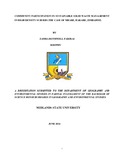Please use this identifier to cite or link to this item:
https://cris.library.msu.ac.zw//handle/11408/353| Title: | Community participation in sustainable solid waste management in high density suburbs. the case of Mbare Harare, Zimbabwe | Authors: | Zamba, Bothwell Farirai | Keywords: | Community participation Solid waste management |
Issue Date: | 2014 | Publisher: | Midlands State University | Abstract: | Solid waste management has become one of the contemporary issues of the 21St Century at local, national, regional and global scale. Studies on community participation in developing countries have been done but up to date gaps exist in the documentation of the real community based projects in solid waste management, challenges affecting full community participation as well as suggested solutions. The impacts of the suggested solutions are only superficially dealt with. This study examined the roles and effectiveness of communities in solid waste management in high density residential areas so as to come up with sustainable solid waste management options with respect to Nenyere area in Mbare, Harare. The study area was purposively selected by the researcher to assess the roles and effectiveness of the community health clubs and waste recycling cooperatives in the Water, Sanitation and Hygiene programmes (WASH) and the Urban Environment Programmes meant to empower the communities to embark in solid waste management activities in their neighbourhoods. The area was also selected by virtue of its ever growing population and unsustainable waste handling and disposal practices which are likely to make it vulnerable to disease outbreaks. To achieve this, semi structured interviews and 100 questionnaires from systematically selected residents were used to obtain information on the various solid waste management activities done at community level from residents and key informants from various organisations that deal with solid waste management issues respectively. Photos, observations and focus group discussions assisted the researcher to unearth the evidence on the ground. Information obtained include socio-demographic data, types and quantities of solid waste generated weekly at household level, activities undertaken by the communities in solid waste management, supporting organisations, challenges encountered, environmentally sound solid waste management strategies as well as legislation and institutional aspects. Research findings revealed that organic waste dominated the solid waste stream and accounted for over 50% of the solid waste generated at household level. Quantity of waste generated was positively correlated to household size. Composting, clean-up campaigns, waste sorting, recycling and education awareness are the main activities undertaken with support from different organisations. Minimum awareness on legislation and institutional aspects negatively affect the community’s compliance to legal obligations. In light of these findings, the researcher recommends that full technical and financial support must be offered to community health clubs and recycling cooperatives by the private sector, non-governmental organisations and local authority. Environmentally sustainable solid waste management practices guided by the principles of the integrated approach and invigorated by environmental education must be fully adopted. | URI: | http://hdl.handle.net/11408/353 |
| Appears in Collections: | Bsc Geography And Environmental Studies Honours Degree |
Files in This Item:
| File | Description | Size | Format | |
|---|---|---|---|---|
| ZAMBA FINAL DHIZ.pdf | 4.63 MB | Adobe PDF |  View/Open |
Page view(s)
310
checked on Feb 19, 2026
Download(s)
288
checked on Feb 19, 2026
Google ScholarTM
Check
Items in MSUIR are protected by copyright, with all rights reserved, unless otherwise indicated.



